The British are still behaving badly in Mallorca, but some fed-up locals say the Germans are even worse now! (and they help fuel the protests against tourists going home…)
The summer season is still in full swing here in sunny Mallorca. But incoming flights are already overcrowded, hotels are busy, beaches are filling up and after weeks of appalling behavior in some of the island’s most notorious party zones, locals are pushing back hard.
So far there have been beach strikes, threats to close the airport, increasingly aggressive anti-tourist graffiti – ‘Tourists go home!’ and ‘Tourists F*** Off’ – while a slew of protest groups have emerged, some with links to notorious Catalan, Valencian and Basque groups.
Earlier this month, a crowd of 15,000 people (mostly locals, but with a few international protesters eager to wade in) took to the dappled streets of Palma, chanting: ‘Let’s save Mallorca – foreigners out!’
There’s certainly plenty to make them feel angry.
Even by Mallorcan standards, the behavior of some tourists seems to have reached a new low recently. And contrary to recent reports, the Germans, not the British, were at the heart of it.
The German tourists are busy all night long – beer and shots – until they are completely satiated, writes Jane Fryer
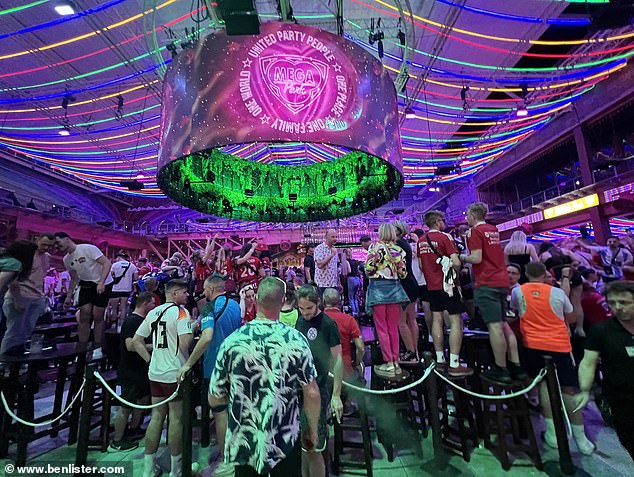
Contrary to recent reports, it is the Germans, not the British, who are at the heart of the bad behavior
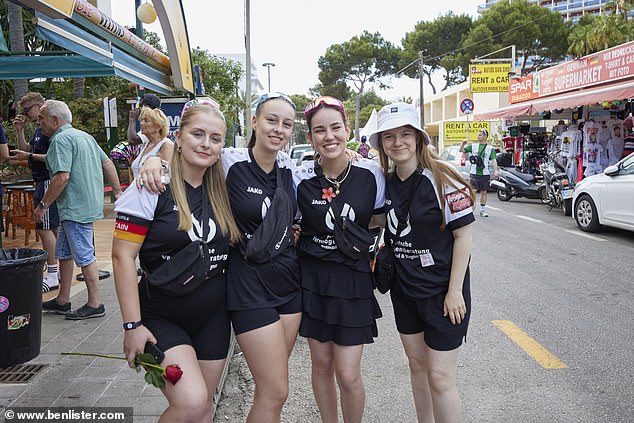
A football team from Frankfurt. They had played hard since 2pm and were already seven Smirnoffs behind
Yes, there have been several shocking incidents involving British nationals in recent weeks.
For example, there was the embarrassing ‘hen party’ where a group of drunken builders from St Albans took offense when they were politely asked not to throw cans and rubbish into the pristine waters of a swanky family beach bar, and proceeded to beat anyone they found too were able to get hold of, including two police officers and a waiter.
“People were running from the tables and grabbing their babies in terror,” Gaston, restaurant manager of the Balneario Illetas beach club, said in a low voice. ‘It was very shocking. It’s a strange way to behave.’
And of course he’s right. Both the groom – a chap called Connor Lorimer, who runs a construction company – and his best man were among the eight thrown into the cells.
But that wasn’t the worst part; not by a long shot.
A few days earlier, riot police were forced to use rubber bullets on a group of rampaging neo-Nazis in the German-dominated ‘beer and sausage’ resort of S’Arenal.
‘Rubber bullets, in Mallorca?’ says Jason Moore, head of the Mallorca Daily Bulletin. ‘It felt like we were in Belfast.’
But as horrible as it sounds, it is depressingly mundane for residents.
Last month, two more German tourists were killed from hotel balconies in separate incidents in S’Arenal. One had been drinking all night, passed out on the balcony rail and simply fell over.
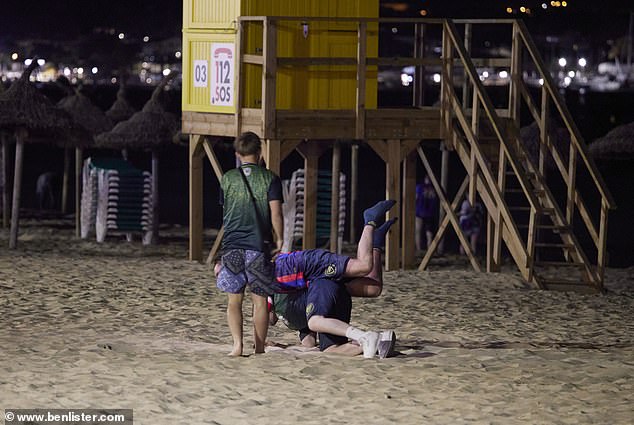
Even by Mallorcan standards, the behavior of some tourists seems to have reached a new low recently
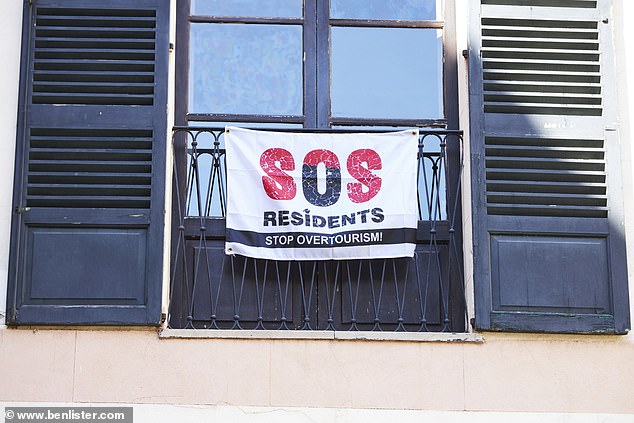
The entire island is beginning to buckle under the pressure of tourism, with increasing pressure on resources, public services, housing and traffic congestion
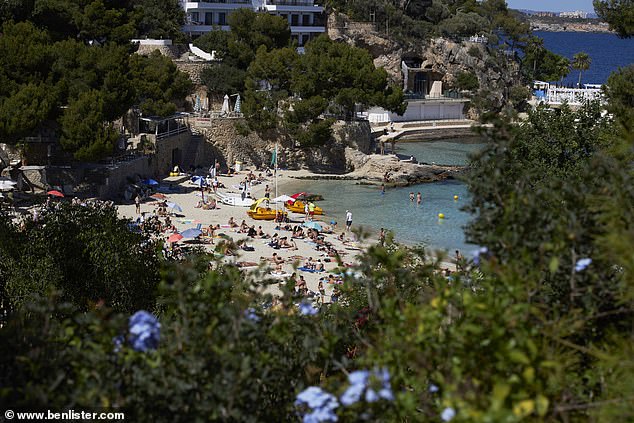
In the past, holidaymakers in Mallorca were mainly British. Some came to drink, others for sun and fun
But what really bothers residents is not the quality of tourists, but the quantity. Because the entire island is starting to buckle under the pressure, with increasing pressure on resources, public services, housing and traffic congestion.
In the past, holidaymakers here were mainly British. Some came to drink, others for sun and fun. They loved it and it was cheap, so many of them bought apartments and villas and retired here.
But towards the end of the 1980s, Germans began arriving in Mallorca, and now they number at least four times more than British every year. And everywhere I go I’m sure they are just as bad as the British, if not worse.
‘Go to S’Arenal. It is the headquarters of the German party. They drink and drink and drink,” I was told. And I do, and it’s one of the most surprising places I’ve been.
It is an almost entirely German seaside resort, with a main street known to everyone as ‘Beer and Ham Street’. It’s full of beer cellars, sausage shops and mid-afternoon huge groups of very drunk Germans in identical football shirts shouting ‘Ole, ole, ole!’ call. over and over as he sipped from giant 5-gallon beer steins the size of elephants’ feet. (You get a football shirt for each elephant leg.)
Women – there are a few, but they are mainly men – are also hard at it.
I meet a nice group of girls who tell me they are on a soccer team back home in Frankfurt. They have been playing hard since 2pm and are already seven Smirnoffs behind.
You wouldn’t know it; they look fresh as daisies. ‘We can drink better than the British. We can go on and on,” says Jana, a twenty-year-old teacher in training.
As we talk, a young guy in a purple football jersey is led away by a friend to a quiet place to get sick. Another lies with his head against the wall.
I meet a very cheerful young metalworker named Carsten, dressed in a matching shirt and shorts, who tells me that he is visiting for the sixth time and prefers vodka and lemon to beer, and will usually have at least three liters of it put away – ‘I’m a big guy!’
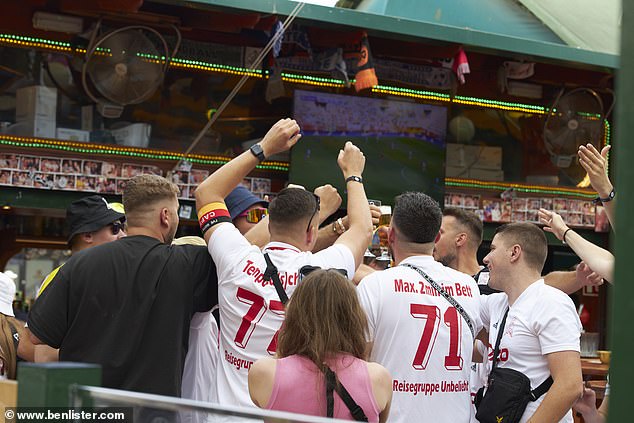
An estimated 50,000 Germans, many of them extremely wealthy, dominate the island
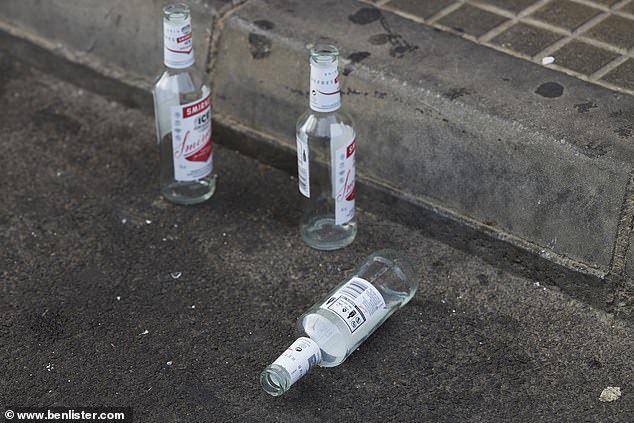
I have never seen so many people drink so persistently for so many hours, writes Jane Fryer
“I love it here,” he adds, “because it’s a bit of sunny Germany, even though I don’t eat Mallorcan food.” That’s a good thing, because there isn’t one. It’s all salami, bratwurst and German beer.
Even in the endless tattoo parlors, the decorative offerings include salamis and bratwurst, but the most popular inkpiece is a huge, frothy beer mug that costs between $80 and $100.
“They come in very drunk and attack each other,” says the man at the door. “They won’t remember what they did that morning.”
I have never seen so many people drink so persistently for so many hours.
The Germans are busy all night – beer and shots – until they are completely satiated. Some continue straight with a refreshing glass of prosecco at their hotel’s breakfast buffet. But they insist they are a different kind of drunk than the British.
‘We are not aggressive. We love singing. We are peaceful,” says Sarah, a caregiver for the elderly and here for her hen night.
Maybe. Although the neo-Nazis weren’t that nice. And a bartender tells me that they are already getting ready for the European Championship football match Germany-Scotland on Friday. “It will all kick off,” he says.
But on a beautiful sunny island like this, tourism is of course only part of the problem.
Over the past decade, the permanent population has risen from 700,000 to 900,000, increasing pressure everywhere.
Thanks to the post-Brexit 180-day rule, which stipulates that Britons are not allowed to spend more than two blocks of 90 days a year in Europe, the British contingent is shrinking. Some of them are also a little tired of being the butt of endless Brexit jokes.
‘As an expat, everything that happens at home is always your fault in some way, but it never ends!’ says Jean, 68, originally from Macclesfield, Cheshire, who has lived here for more than thirty years.
So again, it’s the Germans who dominate. An estimated 50,000 of them, many extremely wealthy. They own super yachts, luxury villas and apartments and, according to some locals, make their presence felt more strongly than the ‘more liberal British’.
They also stick together in pretty towns like Santanyi and Cala Ratjada, which feel more German than Mallorcan, with German shops, German art galleries and sun-drenched markets with pretty stalls manned by Germans selling German products to other Germans.
The jury is out on what one resident calls “the German occupation.”
Some locals complain that they are now spreading out from tourist towns to buy homes in villages in the central heartland, traditionally a safe and cheaper place for Mallorcans to live.
Some feel their hands are tied. ‘You can’t ban Germans; the EU is going bananas!’ says one. Others insist that the Germans are absolutely fine, very organized and that no one has a tourist-phobic attitude, they just want some boundaries.
Meanwhile, no matter how quickly the authorities spray away anti-tourist graffiti, more and more are popping up, along with posters and stickers on windows, on lampposts and scribbled on backstreet walls.
There is no doubt that this beautiful island is in a very delicate balance. The next protest is planned for Saturday.
“This latest protest was just the appetizer,” said Jaume Garau, leader of a new Tourism Congress. ‘The next one will be very big because some Mallorcans are frustrated, divided and fragmented. We have to do something. Our group wants long-term solutions, but many want a quick solution because they can no longer cope.’
At the moment the protests are peaceful. The danger, of course, is that as more and more protesters join the fight, things will fall apart. That one protester will throw something… someone will get hurt… things will flare up… and visitors will get the heebie-jeebies and go to Malaga instead, and the whole tourist industry is affected.
That would be completely devastating for the economy and a great shame. Because apart from perhaps the hellish drinking holes of S’Arenal and Magaluf, Mallorca is a wonderful place: bright, vibrant, beautiful and, for the past seventy years, unfailingly hospitable.
But perhaps now is the time for the government to stop so enthusiastically laying out the red carpet for everyone else and focus a little more on its own people.
